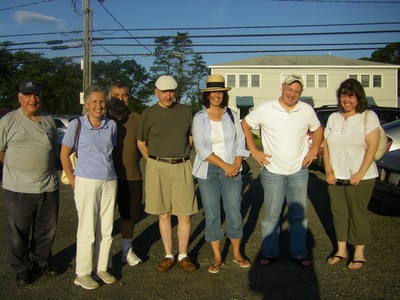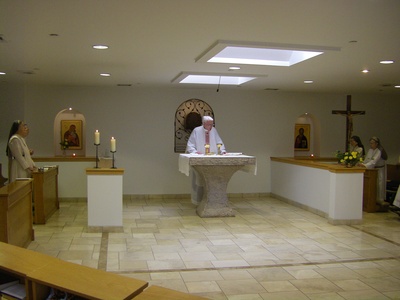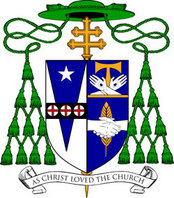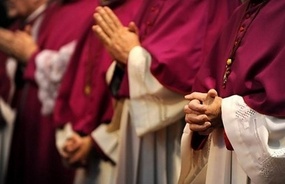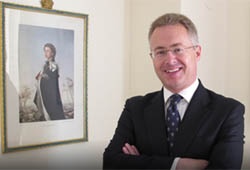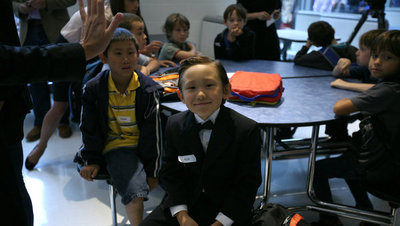The graces of Mass are from God & descend like the dew
Pope writes to Americans on the 9/11 anniversary
To my Venerable Brother
The Most Reverend Timothy M. Dolan
President
United States Conference of Catholic Bishops
Grace to you and peace from God our Father and the Lord Jesus Christ!
On this day my thoughts turn to the somber events of September 11, 2001, when so many innocent lives were lost in the brutal assault on the twin towers of the World Trade Center and the further attacks in Washington D.C. and Pennsylvania. I join you in commending the thousands of victims to the infinite mercy of Almighty God and in asking our heavenly Father to continue to console those who mourn the loss of loved ones.
The tragedy of that day is compounded by the perpetrators’ claim to be acting in God’s name. Once again, it must be unequivocally stated that no circumstances can ever justify acts of terrorism. Every human life is precious in God’s sight and no effort should be spared in the attempt to promote throughout the world a genuine respect for the inalienable rights and dignity of individuals and peoples everywhere.
The American people are to be commended for the courage and generosity that they showed in the rescue operations and for their resilience in moving forward with hope and confidence. It is my fervent prayer that a firm commitment to justice and a global culture of solidarity will help rid the world of the grievances that so often give rise to acts of violence and will create the conditions for greater peace and prosperity, offering a brighter and more secure future.
With these sentiments, I extend my most affectionate greetings to you, your brother Bishops and all those entrusted to your pastoral care, and I gladly impart my Apostolic Blessing as a pledge of peace and serenity in the Lord.
From the Vatican, September 11, 2011
BENEDICTUS PP. XVI
Chaput gives witness to the vocation of bishop
Yesterday’s installation of Archbishop Charles J. Chaput as the new Archbishop of Philadelphia was beautiful on all avenues: music, word, gersture. One of many beautiful parts of his homily was on the ministry (vocation) of the bishop. For that part he quoted the great bishop and Doctor of the Church, Saint Augustine of Hippo. You may think I am cynical by saying this, but I wonder sometimes how often our bishops live up to their vocation as the Church has expected and how often they reflect on the words of a brother such as the eminent Augustine. Perhaps not often enough. AND that is likely the reason Archbishop Charles mention the vocation his homily.
What follows is a terrfic teaching on this vitally vigorous vocation of the Church.
Thanks be to God for the Archbishop!
St. Augustine of Hippo, speaking in the 4th century captured the role of the bishop in these words:
“Jerusalem had watchmen who stood guard . . . And this is what bishops do. Now, bishops are assigned this higher place” — the bishop’s chair in the basilica -“so that they themselves may oversee and, as it were, keep watch over the people. For they are called episkopos in Greek, which means ‘overseer,’ because the bishop oversees; because he looks down from [his chair] . . . And on account of this high place, a perilous accounting will have to be rendered [by the bishop] – unless we stand here with a heart such that we place ourselves beneath your feet in humility.”
Another time, on the anniversary of his episcopal ordination, Augustine described the bishop’s duties in the following way:
“To rebuke those who stir up strife, to comfort those of little courage, to take the part of the weak, to refute opponents, to be on guard against traps, to teach the ignorant, to shake the indolent awake, to discourage those who want to buy and sell, to put the presumptuous in their place, to modify the quarrelsome, to help the poor, to liberate the oppressed, to encourage the good, to suffer the evil and to love all men.”
It’s crucial for those of us who are bishops not simply to look like bishops but to truly be bishops. Otherwise, we’re just empty husks — the kind of men Augustine meant when he said,
“You say, ‘He must be a bishop for he sits upon the cathedra.’ True – and a scarecrow might also be called a watchman in the vineyard.”
Irish government makes peace with Vatican
“The government of Ireland also welcomed the Holy See’s apology to the families and the shame the Vatican has felt. The Irish government concluded by saying that lessons had been learned and looks forward to a new dialogue.”
Pope speaks with new British Ambassador to the Holy See
This morning Pope Benedict XVI received the new Ambassador of Great Britain to the Holy See, Nigel Marcus Baker in an audeince where the new ambassador presented his credentials to the Pope.
Ambassador Nigel Marcus Baker, 45, succeeds Francis Campbell who moved after a term of service to the Holy See to another post. The new ambassador has worked with his country’s diplomatic service in Central Europe and in South America; recently he was in Bolivia. Baker has worked in the Private Office of Prince Charles and for two years lived and studied in Italy. He’s married and has one son.
Today’s address is basically diplo-speak, but there are a few points made by Benedict which are worth thinking about today. I am especially focussing on the Pope’s mention of charity, values, relativism, ecomony, and education. In part, the Pope spoke of the UK stituation of government but what he said has implications in the US:
Continue reading Pope speaks with new British Ambassador to the Holy See
“Ecumenism Is To Be Revived and Promoted” says Mansueto Bianchi
Luca Rolandi ppublished an article on the Vatican Insider “Ecumenism Is To Be Revived and Promomoted” taking his cue from the Italian bishop and president of the CEI commission on Ecumenism and Interreligious Dialogue who spoke at a recent ecumenical event on Spirituality at the Monastery of Bose.
THE well-dressed student in NYC
Forgiveness Has Implications in This Life, the Next
Last Sunday’s Mass readings centered our attention on fraternal charity, fraternal correction. We have to heal the person who causes harm because he or she needs the healing more. The Rule of St Benedict and Pope Benedict had something to say about it. This coming Sunday’s reading continues the theme of forgiveness. The Church in her wisdom keeps on reminding us of the facts that make up the Christian journey and how to live within these “facts” so that we thrive.
Basilian Father Thomas Rosica’s reflections on this coming Sunday’s readings on forgiveness are appropos.
What does it mean, “to forgive”? First of all forgiveness implies that there is something to forgive. Whether it’s something big or small, the need for forgiveness means somebody has done something wrong. The Greek word used for “forgiveness” in today’s parable means “to send away” or “to make apart.” Forgiveness “sends away” whatever has been keeping people apart. Anger or feelings of vengeance are “sent away.” By forgiving, one is no longer under the control of that past sinful act he suffered. We know that Jesus demands boundless forgiveness of his disciples. Forgiving and showing mercy, however are not always simple matters.
Forgiveness doesn’t mean that the people will be reconciled immediately. Nevertheless, it begins the healing process and helps to remove feelings of revenge. To ignore Jesus’ teaching on forgiveness has serious implications in this life and in the next. Do we really believe that our eternal destiny and salvation are harmed or hindered by our inability to forgive while we are on this earth? How do we do justice and show mercy? These are certainly not easy questions for us to answer and they surface in us a myriad of emotions that are also present in this parable.
The Church is called to break down the barriers that divide peoples, to build up relationships of trust and to foster forgiveness and reconciliation among peoples who have become estranged. As followers of Jesus we must be prophets of justice and peace, and always passionate about the suffering of humanity in our times.
Father Thomas Rosica, CSB
“Forgiveness Has Implications in This Life, the Next
Biblical Reflection for 24th Sunday in Ordinary Time A”
Saint Peter Claver
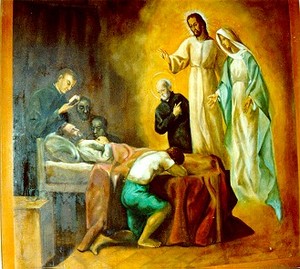 Today the Church liturgically remembers one of her missionary saints, Saint Peter Claver, (1580-1654) a Spainard who came from a very modest but known family heritage. Claver was influenced by what he heard and what he read in Jesuit houses of the missionaries. The brother porter-saint of Claver’s Jesuit house of studies, Alphonsus Rodriquez, frequently spoke of the need great work he could do in sharing the Gospel in mission lands. So moved to serve the Divine Majesty in a distant land, he requested of his superiors to be sent on mission to the New World. In what is known today as Columbia, South America, Claver worked with the negro-slaves teaching them the faith, and attending to their human and spiritual needs. In Claver’s eyes he took Saint Paul’s teaching that there are no distinctions in the Kingdom between Jew and Greek, slave or free, man or woman: all are the adopted children of God. As one person put it, for 33 years Father Peter Claver lavished love on the slaves that transcended the natural order. It was a love that confounded his religious superiors and the leaders in civil society of his day. It is reported that the saint brought to Christ 300K souls.
Today the Church liturgically remembers one of her missionary saints, Saint Peter Claver, (1580-1654) a Spainard who came from a very modest but known family heritage. Claver was influenced by what he heard and what he read in Jesuit houses of the missionaries. The brother porter-saint of Claver’s Jesuit house of studies, Alphonsus Rodriquez, frequently spoke of the need great work he could do in sharing the Gospel in mission lands. So moved to serve the Divine Majesty in a distant land, he requested of his superiors to be sent on mission to the New World. In what is known today as Columbia, South America, Claver worked with the negro-slaves teaching them the faith, and attending to their human and spiritual needs. In Claver’s eyes he took Saint Paul’s teaching that there are no distinctions in the Kingdom between Jew and Greek, slave or free, man or woman: all are the adopted children of God. As one person put it, for 33 years Father Peter Claver lavished love on the slaves that transcended the natural order. It was a love that confounded his religious superiors and the leaders in civil society of his day. It is reported that the saint brought to Christ 300K souls.
